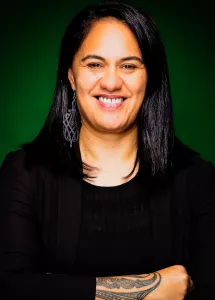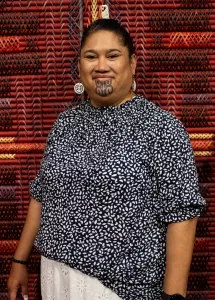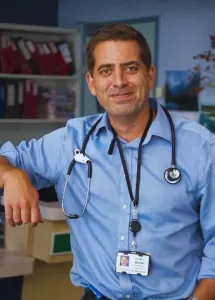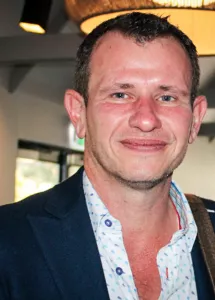Dr Keri Lawson-Te Aho, PhD (Psychology)
Ngāti Kahungunu ki te Wairoa, Ngāti Pāhauwera, Rongomaiwahine, Ngāi Tahu, Ngāi Tūhoe, Ngāti Porou, Rongowhakaata, Ngāti Tūwharetoa, Samoan, Tahitian, Rarotongan, Native American (Blackfeet), McLaren clan (Scotland), Classen clan (Norway).
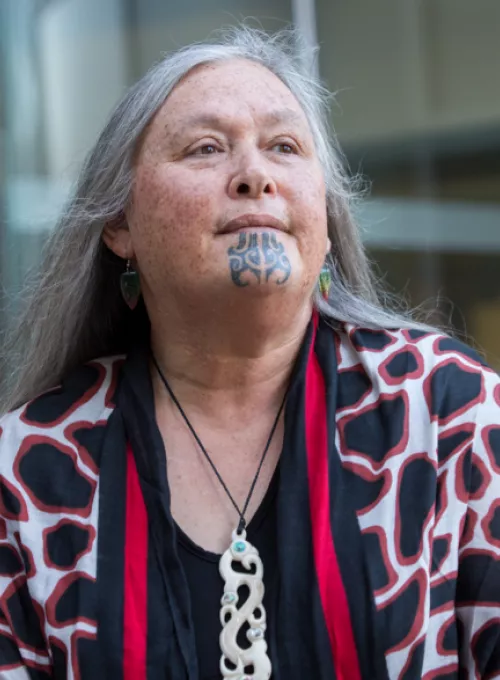
It is an honour to be asked to write this bio for my good friend Keri, a respected and renowned Māori leader. It has also been a challenge deciding what to include in this short bio as there is so much additional information I haven’t been able to include. I first met Keri in 1987 at a Public Sector Māori Health Leadership hui in Porirua. At the time she was working as a benefits clerk and regional manager of the Community Health Initiatives Funding Scheme for the Regional Department of Health in Rotorua. In 1988, Keri enrolled in an undergraduate degree in Māori and social policy at Waikato University. She also started pre-med but gave it up due to her late mother’s diagnosis of cancer. With medical school out of the question, she instead chose to do a psychology degree at Waikato University.
Keri worked hard to achieve academically, while at the same time, nurturing and supporting other Māori students and staying connected with her whānau. Keri achieved A++-A marks for ten papers in 1989 and made the Deans' academic excellence list at the start of her third year. During this time, she was returning home every day to Rotorua to care for and nurse her mum, who had developed cancer, and was tutoring while also mentoring other Māori students. Keri eventually went on to gain her first degree majoring in Psychology and Sociology, her masters with first-class honours and later completed her PhD.
Although committed to Hauora Māori, it was losing her brother in 1988 that helped to shape her passion which she is now nationally and internationally recognised for, in Māori and indigenous suicide prevention. The year following her brother’s death, she applied for and was successful in being awarded a Fulbright Scholarship for suicide prevention research in indigenous communities in the United States and was based at the East-West Center in Hawai’i, and the Native American Research and Training Center at the University of Arizona. She also studied at UC Berkeley, Johns Hopkins Medical School, the Indian Health Services and visited tribal communities in Alaska, Tucson, Washington state and New Mexico.
In 1998 Keri wrote the background document that shaped the development of Kia Piki te Ora o te Taitamariki the first indigenous youth suicide prevention strategy in the world. Kia Piki te Ora o te Taitamariki enabled sustained relationships with Dr Tracy Westerman from Australia; the late Dr Dorothy Lonewolf Miller from the Blackfeet people of Montana, Dr Jenny Joe from the Navajo nation, and Kamanao'pono Crabbe. More recently she co-authored the Tūramarama ki te Ora National Māori Strategy for Addressing Suicide alongside Sir Mason Durie and others. Keri convened the first international indigenous suicide prevention symposium in 2014 that was attended by 400 acclaimed indigenous and Māori speakers, bereaved whānau, psychology students, clinicians, community service providers and others from all walks of life. Between 2012-2017 Keri convened five Māori public health summer school programmes drawing record numbers of participants from across the health and community sectors.
Keri has dedicated the last 30 or more years of her life to Hauora Māori and Māori and indigenous suicide prevention. She is now a renowned researcher, author, highly esteemed leader and global leader, a highly regarded commentator on Māori and indigenous suicide prevention; historical trauma; takatāpui mental health and wellbeing; hauora Māori inequities; historical trauma; indigenous human rights, population-based indigenous mental health and rangatahi resilience.
Overachieving has become a hallmark of Keri’s life: she was a Māori advisor and policy analyst for the Public Health Commission where she wrote He Matariki, the first-ever strategic plan for Māori public health, was Senior Advisor with the Māori Health Development Commission and New Zealand Families Commission. She was also Strategic Advisor for Ngāi Tāhu Development, a Ngāi Tāhu PhD scholar, worked on the Tūhoe blueprint for a new generation iwi authority and co-authored the Mauri Ora Framework with the Second Ministerial Taskforce for Whānau Violence Prevention. Keri wrote the Post Entry Training Plan for the Clinical Training Agency in 1997 which led to the Māori Psychiatric Registrars Training Programme, development of Te Rau Puawai, Te Rau Matatini and associated rōpū. She also co-developed and co-taught the first New Zealand Indigenous Psychology postgraduate paper at Victoria University, has been educating doctors, medical students psychology students and counsellors, social workers, nurses and community workers since 1989 and has offered self funded decolonisation education in Māori and indigenous communities in the South Pacific, Australia, Alaska, San Francisco, Arizona and many other communities since 1989.
Keri now works for the University of Otago, Wellington School of Medicine where she is as an award-winning educator, lecturer and post-graduate supervisor. Keri is a researcher with the Prime Minister's prize-winning research group He Kainga Ōranga and fulfils a cultural leadership role within the wider university, Māori communities and is actively involved in protest and resistance actions such as the Foreshore and Seabed protest. She supports Doctors without Borders, Greenpeace, People against Prisons Aotearoa, land rights activism, Treaty activism and is a staunch advocate for rangatahi/mokopuna. Keri has three mokopuna. Keri’s greatest love that has driven her passion, activism and a voice for those less fortunate is her whānau. Keri sums up her life below;
“We can’t give up, because other people rely on those of us who have a voice (and therefore privilege), to exercise our voices on their behalf. If I go to my grave knowing that I’ve dedicated my whole life to speaking up for those who don’t have a voice then maybe I’ll pass on [away]...to be with my tūpuna [ancestors] in a very happy state. The power of people and the power of political activism, and the power of the voices of the oppressed should never be underestimated” (University of Otago, 2018).
Keri is a good example of a leader who practices what she preaches. She will speak up for those who don’t have a voice, but importantly she will also create a safe space for others to speak up for themselves and encourage them to find their voices.
Dr Keri Lawson-Te Aho (PhD, Psychology, Faculty of Science)
Lecturer, Hauora Māori/Māori Public Health
The prize for Outstanding Teacher and Supervisor, UOW, 2018
Māori and Indigenous Suicidologist
Researcher, Te Roopu Rangahau Hauora ā Eru Pōmare
Researcher, He Kainga Ōranga/Housing and Health
NZ Representative on the World Dignity University (Nobel Peace Prize Group Nominee 2015-2017)
International Taskforce of Indigenous Psychologists
Allied Health Professional, Doctors without Borders
Certified Indigenous Entrepreneurship Educator (NFTE, New York)
Research publications
Lawson-Te Aho, K.R. & Liu, J. (2010). Colonisation: The Legacy of Violence and the Necessity for Self Determination. International Journal of Conflict and Violence, 4(1), 124-133.
Ball, J. Thornley, L., Signal, L., Lawson-Te Aho, K., & Rawson, E. (2014). Building community resilience: learning from the Canterbury earthquakes. Kotuitui: New Zealand Journal of Social Sciences Online
Liu, J. Lawson-Te Aho, K. & Rata, A. (2014). Constructing identity spaces for first nations peoples: Towards an indigenous psychology of self-determination and cultural healing. International Journal of Psychology and Developing Societies, 26 (2), 143-153.
Lawson-Te Aho, K. (2014). The healing is in the pain: revisiting and re-narrating trauma histories as a starting point for healing. International Journal of Psychology and Developing Societies, 26 (2), 181-212.
Lawson-Te Aho, K. (2016). The power of hope for Maori youth suicide prevention: Preliminary themes from the Aotearoa/New Zealand HOPE studies. Full Circle: Returning Indigenous Research to the People.
Lawson-Te Aho, K. (2017). The case for reframing Māori suicide prevention research in Aotearoa/New Zealand. Journal of Indigenous Research on line, 6 (2017).
Love, C., Lawson-Te Aho, K.R., Shariff, S., & McPherson. (2017). Towards Mauri Ora: Examining the Relationships between indigenous-centric entrepreneurship education and Māori suicide prevention in Aotearoa, New Zealand. Te Mauri Pimatisiwin: International Journal of Indigenous Health and Wellbeing 2(2), 9.
Ombler, J., Atatoa-Carr, P., Nelson, J., Howden-Chapman, P., Lawson-Te Aho, K., Fariu-Ariki, P., Cook, H., Aspinall, C. & Pierse, N. (2017). Ending homelessness in New Zealand: Housing First Research programme. Parity, 30(10), 5-7.
Chas McCarthy, Ngāti Whitikaupeka, Ngāti Haua, Ngāti Tuwharetoa, Te Āti Hau Nui a Pāpārangi, Senior Portfolio Manager, Ministry of Health.
